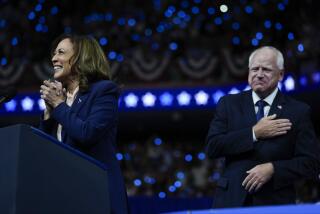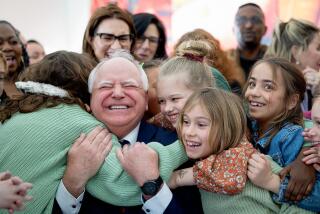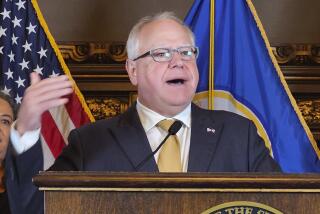Mitt Romney tries out potential running mates
- Share via
PORTSMOUTH, N.H. — When Sen. Kelly Ayotte joined Mitt Romney for a tour of fishing boats this week, she was doing more than campaigning in her home state for the presumptive Republican presidential nominee and for slashing President Obama’s regulatory policies.
She was one of a number of political stars who have shared the stage with Romney in recent days, auditioning — in the view of many — to be his running mate.
The campaign trail with Romney has felt like a series of tryouts lately as he tests the chemistry and optics of potential vice presidential picks. The next will take place Thursday, when he campaigns with Virginia Gov. Bob McDonnell.
PHOTOS: The search for Romney’s running mate
Though Romney is not expected to make a formal decision anytime soon, the vetting has clearly begun, with the campaign scrutinizing potential running mates’ electoral experience, geographic desirability and affinity with GOP constituencies that remain wary of Romney.
“I know the bowl has about 19 or 20 folded pieces of paper in it and they keep shaking the bowl,” former New Hampshire Gov. John Sununu said shortly before the Portsmouth event, referring to the number of names in consideration.
In recent months, potential running mates have demonstrated their appeal as well as their potential drawbacks as they have joined Romney on the trail. New Jersey Gov. Chris Christie turned out an enormous crowd — by Romney standards — when he joined the candidate as a surprise guest in New Hampshire and demonstrated the pugnacity that has endeared him to many within his party by shouting down a group of protesters. But he also seemed to outshine Romney.
Others, like Wisconsin Rep. Paul D. Ryan, Florida Sen. Marco Rubio and former Minnesota Gov. Tim Pawlenty, have shown an ability to connect with voters in a way that Romney has not by virtue of their blue-collar backgrounds — telling tales of economic struggle that Romney did not experience as the son of a three-term Michigan governor and former auto executive.
While nearly all of the likely prospects have steadfastly denied that they have any interest in the job because they are committed to their current jobs as governors and senators, many are also simultaneously burnishing their resumes; Rubio, for example, gave a major foreign policy address last week. And some who have long said they held no desire to be the nation’s second in command appear to be more amenable to it now. Romney “might be able to convince me,” Christie said this week. “He’s a convincing guy.”
In recent decades, vice presidents have taken on more active roles than in earlier times, and the primary process has allowed nominees, rather than party bosses, to pick their running mates. Typically, a presidential candidate will seek to balance whatever weakness or resume gap he has, such as President George W. Bush tapping Dick Cheney because of his foreign policy and national security experience.
Geography can play a role, such as when John F. Kennedy picked Texan Lyndon B. Johnson and won that state’s trove of electoral votes. Romney will clearly be under pressure to pick a running mate from the socially conservative or tea party wing of the GOP. Age and background can also be considerations, such as President Obama’s pick of his elder Senate colleague Joe Biden or Sen. John McCain’s pick of the youthful Sarah Palin.
The latter will clearly cast a shadow on the GOP thought process this time around.
Plucked from obscurity during her first term as governor of Alaska and poorly vetted, Palin was chosen to give the McCain campaign a much-needed jolt of energy and an entree to women voters disappointed by Hillary Rodham Clinton’s Democratic primary loss to Obama. But ultimately she became a liability for the campaign because of the gaps in her knowledge of foreign policy and questions about her competency.
“After the 2008 election, the reality is the pick is going to be evaluated on one criteria: Is that person who [Romney] picks prepared to be president from the moment of the inauguration, and do Republicans, Democrats and the media all agree that that person is unquestionably prepared to be president in the way that Joe Biden was or Dick Cheney was,” said former McCain strategist Steve Schmidt.
The fallout from the controversy over Palin’s slim credentials may weigh against some rising stars in the party like Ayotte and New Mexico Gov. Susana Martinez, even though they both hail from swing states and could appeal to independent women, a group with which Romney faces a major deficit against Obama.
Similar experience questions have been raised about Rubio, despite his obvious strengths as a darling of the tea party, his ability to boost Republicans in their quest to regain Florida and the perception that he could broaden Romney’s appeal to Latinos because of his background as the son of Cuban immigrants.
For those reasons, some Republican leaders say Romney may turn to more seasoned figures in the party such as former Florida Gov. Jeb Bush, Ohio Sen. Rob Portman or Pawlenty, a key surrogate for the campaign who withdrew from the Republican race early last year but developed a close friendship with Romney.
Though contenders like Portman and Pawlenty lack the flash of Christie, that may not be as important this year, when Republicans are trying to make the argument that despite its glitz, the Obama campaign failed to deliver on what was promised.
South Carolina Sen. Lindsey Graham, a close confidant of McCain who was heavily involved in the Arizona senator’s 2008 bid, said that although Republicans were facing serious head winds in 2008, the vice presidential pick “had to be something different, showing that it wouldn’t be a continuation of the last eight years.”
Because of the economic conditions, Graham said, “we are running with the wind to our back in 2012,” with some blue states as well as swing states like Indiana, Virginia and North Carolina “very much there for the taking.”
He said a vice presidential pick like Rubio, Bush or Portman, who could help in the key states of Ohio or Florida, would be smart.
But, he added: “You’ve got to not just win a state; you’ve got to create a candidate that has the heft to not become the story themselves and somebody that adds [appeal], not only in a specific region or state, but can add gravitas to the ticket.”
Romney has been circumspect about the pool of candidates. Perhaps his most revealing comments on the subject were during an exchange with Jay Leno, who asked him to play a word association game on potential running mates during his visit to the late-night couch.
He described Rubio as “the American Dream,” Ryan as “creative,” South Carolina Gov. Nikki Haley as “energetic” and Christie as “indomitable.” But as his aides begin the vetting process, he has insisted that he doesn’t yet have a list — or at least a short list.
More to Read
Get the L.A. Times Politics newsletter
Deeply reported insights into legislation, politics and policy from Sacramento, Washington and beyond. In your inbox twice per week.
You may occasionally receive promotional content from the Los Angeles Times.












